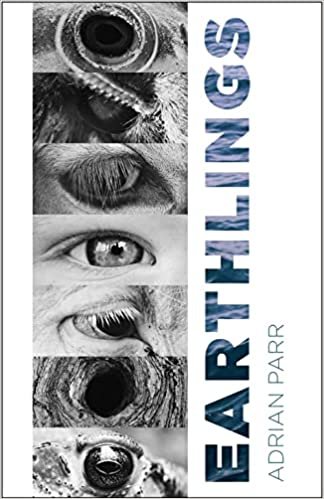Reviews of Work
Earthlings
A powerful new lens through which to examine our glorious and battered planet.
Bill McKibben, author of Eaarth: Making a Life on a Tough New Planet and The Flag, the Cross, and the Station Wagon: A Graying American Looks Back at His Suburban Boyhood and Wonders What the Hell Happened
In a narrative style that combines analytical rigour with lyrical empathy and proximity to her subject-matter, Adrian Parr designs a stunning pattern of interaction across entities, elements, ethnicities, generations and species without amalgamating them or flattening their differences. Poetic and speculative, engaged and concerned, but also polemical and investigative, this book is an ode to the affirmative force of relations and processes of becoming, and to the transformative force of the imagination. She emphasizes the joyful aspects of the interdependence of all living things and shows how they are steered by a constant energy exchange with one another. Parr's eco-ontology takes the shape of a trans-environmentalist journey, that challenges anthropocentrism, while appealing to what is best in humans, namely our shared concern for the future of our—and several trillion other—planetary species.
Rosi Braidotti, Distinguished University Professor, Utrecht University, the Netherlands
This highly original contribution on the impending climate catastrophe in the age of the Anthropocene is nothing short of a new bio-ecological philosophy for life. It confronts head-on the need for a new ethics for cohabitation with other life forms on this planet. In doing so, it asks profound questions on the basis of what it means to be human in the twenty-first century.
Brad Evans, author of Ecce Humanitas: Beholding the Pain of Humanity
Insisting that environmental degradation is a crime against the planet and against our own humanity, Parr concludes that late global capitalism has ravaged the earth and that as earthlings we must creatively and collectively produce—give birth—to a new earth: she thus urges new ways of dwelling on earth outside of capitalist expansion, exploitation, despoiling, and death.
Jana Evans Braziel, author of Riding with Death: Vodou Art and Urban Ecology in the Streets of Port-au-Prince
Winner of the Silver Nautilus Book Award in the Ecology and Environment category
Birth of a new earth
As Adrian Parr suggests in timely fashion, imagination may be the best weapon we have in the fight against environmental destruction, as useful as a new engine or a bigger windmill.
Bill McKibben, author of Eaarth: Making a Life on a Tough New Planet
Birth of a New Earth is one of those rare and brilliant books that critiques the ongoing destruction of the environment in a writing style that is lyrical, compassionate, and as accessible as it is informative. Parr masterfully weaves together a language of critique and possibility and in doing so makes a convincing case for environmental and economic justice on a global scale and offers a powerful argument for rethinking the meaning and practice of politics.
Henry Giroux, author of America at War with Itself
This is a prescient book, one that not only provides a rigorous and critical analysis of emergent environmentalisms but also charts how imaginations of a "new earth" can be forged at the limits of liberal democracy. In this sense, the book is as much about the political as it is about the environmental. It is a must-read for our times.
Ananya Roy, author of Poverty Capital: Microfinance and the Making of Development
"Environmentalism" will not survive this book. It will be frustrating and disappointing for many readers to discover that their good deeds to save the planet can be useless and even counterproductive; they may be nourishing the machine producing environmental degradation: global capitalism, corporate governance, and militarism. But they will also discover in this book stimulating windows to emancipatory imagining and transformative politics that really care for Mother Earth
.Gustavo Esteva Figueroa, author of The Future of Development: A Radical Manifesto
Adrian Parr’s marvelous book Birth of a New Earth does not simply argue that capitalism, neoliberalism, and militarism are incompatible with environmental concerns but also provides concrete examples of how to overcome this incompatibility, which is the cause of our greatest natural, political, and social emergencies. Parr calls upon activists and intellectuals to forcefully resist false policies that claim to foster global sustainability in favor of radical interventions that, one local step at a time, will truly save the world.
Santiago Zabala, author of Why Only Art Can Save Us
Cleaver: Philadelphia's International Literary Magazine
By: Robert Sorrel
THE WRATH OF CAPITAL: NEOLIBERALISM & CLIMATE CHANGE POLITICS
Cuomo, Chris and Brooke Shuenerman. ‘Thinking Against the Wrath of Capital’. Hypatia, Vol 29, No. 3 (Summer 2014): 695-701.
Miller, Ryder. ‘Review. The Wrath of Capital: Neoliberalism and Climate Change Politics’, Electronic Green Journal, Issue 35 (Earth Day 2013). http://www.escholarship.org/uc/item/11m9z248#page-2
Pearse, Rebecca. ‘Climate Capitalism and Its Discontents’, Global Environmental Politics, Vol. 14, No. 1 (February, 2014): 130-135.
Stoekl, Alan. ‘A Differing Shade of Green’, Radical Philosophy (May-June, 2013).
HIJACKING SUSTAINABILITY
Carlson, Scott. ‘The Threat to Sustainability’, Architecture: The Chronicle Review, May 1, 2009: B19.
Hillier, Jean. ‘Book Review: Hijacking Sustainability’, Deleuze Studies, Vol.4, No.1 (2010): 138-144.
Moore, R. ‘Review: Adrian Parr, Hijacking Sustainability’, Spontaneous Generations: A Journal for the History and Philosophy of Science, Vol. 4, No. 1 (2010): 283-285.
Poole, Steven. Book Review: Hijacking Sustainability’, Guardian UK, May 2, 2009.




